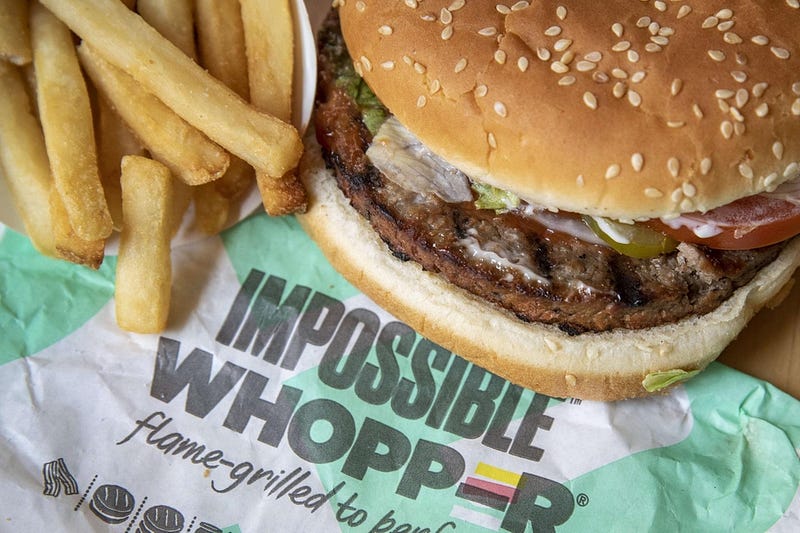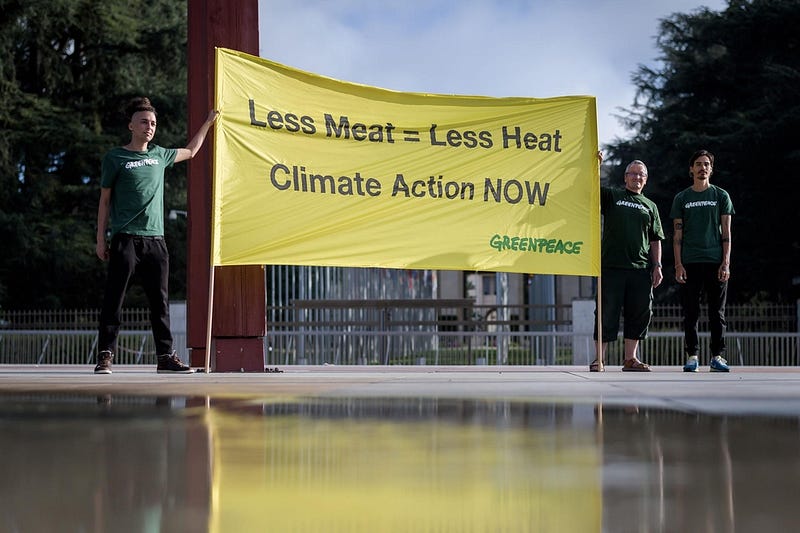The battle over foods without meat is getting pretty brawny. Last week the non-profit American Civil Liberties Union asked the US state of Arkansas to stop enforcement of a law that bars words such as “burger” and “steak” for plant-based products that contain no animal meat. And the Centre for Consumer Freedom, a US group that lobbies on behalf of the fast food, meat and tobacco industries, placed prominent ads in American newspapers hinting that the chemicals added to imitation-meat burgers and sausages made them less healthy than the real thing.
All this took place in the week that a plant-based “egg” made from mung bean protein, canola oil, onion puree and turmeric, was welcomed onto the shelves of one of America’s largest national grocery retailers. Right around the same time, Goldsmiths, University of London, banned the sale of beef in campus food outlets as part of its bid to tackle climate change. And earlier this month Burger King introduced the Impossible Whopper, featuring a meatless patty designed to taste, feel and even “bleed” like actual red meat, in more than 7,000 outlets in the US.
They shift at random between omnivorous and vegetarian diets but seem to want to eat less meat and dairy, as long as the food on their plate tastes just as good
Plant-based foods that look and smell like the animal product they mimic are becoming one of the world’s biggest trends. Fish-free tuna is a blend of peas, chickpeas, lentils, soy, fava, navy beans and algae oil. Vegan sea urchin is made of flavoured vegetable oils and soy-based ingredients. Meatless chicken has wheat flour, canola oil and pea protein. And then there is the ultimate red meat alternative, the burger that sizzles and oozes blood-like beet juice and which competes gram for gram with the animal product, both in terms of protein and flavour.

According to some estimates, the plant-based food market will be worth as much as $140 billion in 10 years. Interestingly, the target is not the committed vegan or even the vegetarian but an entirely different group of consumers — the flexitarians. They shift at random between omnivorous and vegetarian diets but seem to want to eat less meat and dairy, as long as the food on their plate tastes just as good. Flexitarians appear to value the health implications of plant-based alternatives to meat, fish and eggs. They also prize the virtuous feeling of having done their bit for the planet by reducing the environmental impact of their food choices.
This is hardly surprising. Earlier this month a report written by more than 100 scientists for the UN’s Intergovernmental Panel on Climate Change (IPCC), warned that rising temperatures are putting the world’s food supply at risk and the West’s high consumption of meat and dairy produce is partly to blame. This is down to rearing livestock, which means the inevitable production of methane, a greenhouse gas contributing to global warming, as well as deforestation to expand pastures.
The IPCC report reiterated, but far more starkly, something we already knew. An earlier finding from the UN’s Food and Agriculture Organisation (FAO) said that raising livestock uses about 70 per cent of all agricultural land, yet represents 18 per cent of calorie intake worldwide. It stands to reason, then, that producing food for vegetarians, vegans and even flexitarians requires much less land than raising meat. And overfishing is increasingly seen as a reason to turn to plant-based seafood.
The battle has commenced — and the meat industry is unwilling to cede ground easily
Even so, all the environmental, ethical and health-related arguments in the world cannot guarantee that plant-based foods will significantly change entrenched patterns of consumption. Meat, for instance, has continued to be consumed in rising quantities — rising nearly fivefold since the 1960s, from 70 million tonnes a year globally to more than 330 million tonnes in 2017.
As countries get richer, they tend to eat more meat, which is why the average Chinese person now consumes nearly three times more than in the early 1970s. The FAO says meat consumption in the richest nations has continued to rise by 0.7 per cent a year since 1991.

So what is in prospect for all the new plant-based alternatives to meat, fish and eggs? Will they be the flavour of the month, the year, or of the next few years, but fail to push a larger cultural shift in consumption? All that is certain is that the battle has commenced — and the meat industry is unwilling to cede ground easily. It has an entrenched advantage — not just habits of consumption but the fact that in several American states and in France, there are laws that restrict the word “meat” to animal products. The US livestock lobby also challenges plant-based food manufacturers’ right to use descriptions such as sausage and bacon for products that do not contain meat from slaughtered animals.
Right now, the fight is largely being waged around the art and science of food labelling. But the real struggle is changing tastes for good and cultivating an appetite for what we eat based on how it was produced and what it does to us and the planet.


